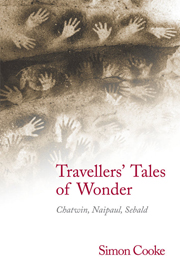Book contents
- Frontmatter
- Contents
- List of Illustrations
- Acknowledgements
- Introduction: The Wonder that Came Later
- I ‘Horizon of expectations’: Travels in Literary History
- II Readings in Contemporary Travellers' Tales of Wonder
- 4 Bruce Chatwin and the ‘modern WONDER VOYAGE’: In Patagonia (1977)
- 5 V. S. Naipaul and the ‘gift of wonder’: The Enigma of Arrival (1987)
- 6 W. G. Sebald's Travels through ‘das unentdeckte Land’: Die Ringe des Saturn (1995)
- Afterword: The ‘unlimited vicissitudes of travelling’
- Bibliography
- Index
4 - Bruce Chatwin and the ‘modern WONDER VOYAGE’: In Patagonia (1977)
from II - Readings in Contemporary Travellers' Tales of Wonder
Published online by Cambridge University Press: 05 October 2013
- Frontmatter
- Contents
- List of Illustrations
- Acknowledgements
- Introduction: The Wonder that Came Later
- I ‘Horizon of expectations’: Travels in Literary History
- II Readings in Contemporary Travellers' Tales of Wonder
- 4 Bruce Chatwin and the ‘modern WONDER VOYAGE’: In Patagonia (1977)
- 5 V. S. Naipaul and the ‘gift of wonder’: The Enigma of Arrival (1987)
- 6 W. G. Sebald's Travels through ‘das unentdeckte Land’: Die Ringe des Saturn (1995)
- Afterword: The ‘unlimited vicissitudes of travelling’
- Bibliography
- Index
Summary
One arrives in the world and is disappointed. Then one goes to Rome and is disappointed. Paris, Brussels, London. Again one is disappointed. Berlin is not the city one wants to live in. One does not steal horses on the Puszta. Everywhere, the mountains are less high than one had thought. The plains less wide. The waters less deep. And in Holland, one finds the sails of the windmills too small. So one seeks out the harbours. So one deserts Europe. So one crosses the sea. But again one is disappointed. One wanders out to India and is disappointed. In China, everything is as it was at home, only a little bigger. To Patagonia one travels no more.
Jürg Amann, Patagonien: Prosa (1985: 7; my translation)When Bruce Chatwin published an account of a journey to a part of the world which had come to symbolise, in the Western cultural imagination, the distance to which ‘one travels no more’, it appeared as both novelty and relic, at once literary newfoundland and lost world regained. As its premise was the mythically resonant, marvellously unlikely quest for a replacement for a scrap of Giant Sloth skin which the traveller had gazed upon in wonder as a child in his grandmother's cabinet of curiosities, believing it to be a ‘piece of brontosaurus’, and which had been discarded after her death (Chatwin 1977: 1).
- Type
- Chapter
- Information
- Travellers' Tales of WonderChatwin, Naipaul, Sebald, pp. 59 - 98Publisher: Edinburgh University PressPrint publication year: 2013



